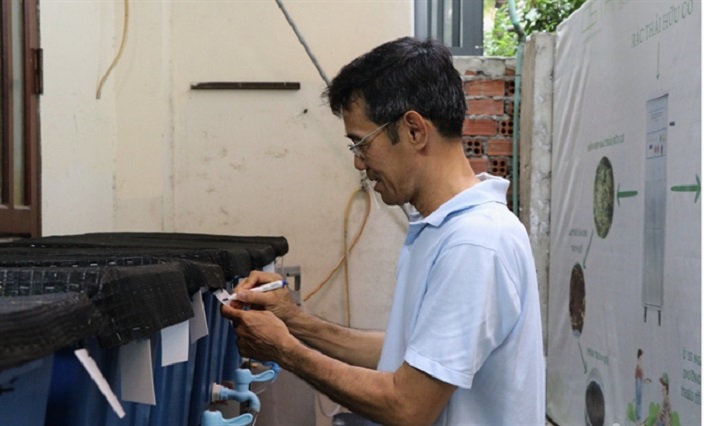
For many years, the 51-year-old mechanical engineer living in Biên Hòa City of southern Đồng Nai Province has always been concerned about finding effective solutions to treat organic waste. Because he saw the situation of organic waste increasing, especially in urban areas.
"If organic waste is not handled properly, it will pollute the environment and affect human health," Tuấn Anh said.
Then, he conceived the idea of creating an effective and environmentally friendly organic waste treatment device, turning waste into a valuable resource.
On the path towards a green - clean - beautiful environment, waste treatment is always a difficult problem.
After five years of diligent research and testing, Tuấn Anh has successfully created a machine that turns organic waste into microbial organic fertiliser.
The machine has a simple structure including a container, crushing system, probiotic spraying, mixing and water separation, he said.
Organic waste will be crushed and mixed evenly with microbial products and separated into separate residue and aqueous solution, he explained.
For the water solution, put it in a tank or compost bin for 30 days to become a liquid fertiliser. The composting process takes place in an anaerobic environment, helping to accelerate the decomposition process and create microbial organic fertiliser.
And the residue after being crushed and mixed with probiotics and earthworm biomass will be placed in a tray that is used as food for earthworms and a substance for decomposing waste using micro-organisms to help limit odours and make the decomposition process faster, he said.
According to the engineer, the organic waste crusher is capable of processing 30kg of waste per hour, helping to reduce the amount of waste released into the environment and provide natural fertiliser for plants.
The advantage of this organic waste crushing machine is that it can be applied in different locations such as households, restaurants, tourist areas, offices and schools.
"The cost of producing a trash crusher is less than VNĐ60 million (US$4,000) but it contributes effectively to solving the problem of organic waste and protecting the environment," Tuấn Anh said.
“The use of organic waste crushers to treat waste on site also help reduce greenhouse gas emissions. This is a practical solution that contributes to environmental protection, in accordance with the ‘Net Zero’ orientation implemented by Đồng Nai Province,” he added.
Currently, the organic waste crusher invented by Tuấn Anh is being used effectively in Biên Hoà parish in Đồng Nai Province and An Binh parish in neighbouring province of Bình Dương.
The microbial organic fertiliser made by the machine is highly appreciated by users, helping plants grow stronger and greener.
Đỗ Thái Hoà, who operates this machine in Biên Hòa parish, said: "Since using the machine, the amount of organic waste in the parish has decreased completely. Many small traders at the market, when they learned that the parish had this machine, even brought damaged vegetables to ask for recycling.”
“The microbial organic fertiliser created by the machine is very good for plants, helping them grow faster," Hòa said.
Tuấn Anh's machine has been highly appreciated by experts and was awarded an industrial design patent for waste treatment equipment by the Department of Intellectual Property (Ministry of Science and Technology). He also registered a patent at the World Intellectual Property Organisation (WIPO).
The mechanical engineer said that he is continuing to perfect the organic waste crusher to improve operational efficiency and wishes to co-operate with investors to produce and distribute this machine on a large scale, contributing to protect the environment.
With practical benefits, the machine that turns organic waste into microbial organic fertiliser promises to contribute to solving the organic waste problem and effectively reduce environmental pollution, especially in urban areas. — VNS